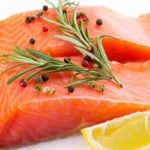When it comes to salmon, it’s not just the flavorful taste that is worth mentioning, but also its considerable nutritional value, including its high protein and omega-3 fatty acid content, particularly DHA.
According to nutritionist Huang Junsheng from Taiwan, China, DHA – short for Docosahexaenoic acid – is an essential unsaturated fatty acid that the body cannot produce on its own, hence the need to obtain it from our diet. DHA plays a vital role in supporting heart, brain, vision, and immune health, slowing down the aging process, aiding in muscle recovery, and preventing aging. Rich sources of DHA include seafood (especially fish), egg yolks, and certain vegetables and seeds.
Despite salmon’s richness in DHA and other nutrients, not everyone can afford or consume salmon regularly or daily due to its high cost and limited availability. Recognizing this, Dr. Huang suggests an excellent alternative: mackerel. Mackerel is not only rich in protein and DHA, with up to 3 times more DHA content than salmon, but it is also much more affordable and easily accessible in markets and supermarkets, even in rural areas.
He points out that while 100g of salmon contains 1614 mg of DHA, the amount of DHA in the same quantity of mackerel soars to an impressive 4503 mg. He even shares a top 10 list of seafood high in DHA and EPA (eicosapentaenoic acid – another crucial unsaturated omega-3 fatty acid), with mackerel taking the lead and salmon ranking third.
Beyond its wealth of protein and omega-3 fatty acids like DHA and EPA, mackerel is also loaded with an array of other nutrients, minerals, and antioxidants. This nutritional abundance translates into a multitude of health and beauty benefits associated with mackerel, including:

Mackerel is loaded with an array of other nutrients, minerals, and antioxidants.
Heart health
Mackerel is a heart-healthy choice due to its unsaturated fatty acid content. Individuals with high blood pressure may find relief by incorporating mackerel into their diet, potentially reducing their risk of heart disease.
Additionally, mackerel provides a significant amount of minerals, vitamins, and omega-3s, all of which play a role in enhancing blood circulation and flow. Omega-3s in mackerel are also known to reduce blood fat levels without increasing bad cholesterol.
Strong bones
Mackerel plays a role in maintaining strong bones, thanks to its abundant supply of vitamin D. Vitamin D from mackerel has been shown to reduce the risk of bone fractures. People who consume mackerel at least once a week may see up to a 33% reduction in this risk. Furthermore, mackerel is a rich source of calcium, a mineral essential for building strong bones.

Mackerel plays a role in maintaining strong bones
Brain health
Mackerel, being both delicious and nutritious, is an excellent choice for supporting brain health. Regular consumption of mackerel benefits overall brain health and development, while also helping to slow down the aging of brain cells. Mackerel also plays a part in lowering cholesterol and triglycerides, two factors that can hinder blood flow to the brain, thereby protecting us from cerebrovascular problems.
Cancer prevention
Mackerel contains potent antioxidants that combat cancer-causing free radicals, slowing down the growth and spread of cancer cells. Moreover, the omega-3 fatty acids abundant in mackerel have been linked to inhibiting the development of breast, stomach, and kidney cancer cells. Not to be overlooked is the high vitamin B12 content in mackerel oil, which plays a significant role in overall cancer prevention.

Mackerel contains potent antioxidants that combat cancer-causing free radicals
Reduced risk of diabetes
Studies indicate that increasing the intake of polyunsaturated fats can reduce the likelihood of developing type 2 diabetes. Conversely, consuming foods high in saturated fats can increase this risk. Mackerel is a rich source of omega-3s, beneficial polyunsaturated fats that aid in managing the risk of diabetes.
Combating depression, Alzheimer’s disease
Mackerel not only abounds in brain-healthy nutrients and antioxidants but is also considered effective in combating depression and memory-related disorders like Alzheimer’s disease. This is partly due to the omega-3s and other nutrients in mackerel, which have the potential to reduce stress, alleviate depression by improving brain function and reducing inflammation
“3 Simple Steps to Remove the Fishy Smell of Salmon”
Are you looking for ways to get rid of that unpleasant fishy smell associated with salmon dishes? If so, we have some useful tips that can help you make a delicious and healthy meal without the fishy odor. Keep reading to learn our easy-to-follow suggestions for removing the odorous smell from salmon dishes!
Exploring Natural Foods for Allergy Relief
Dealing with allergies can be difficult and uncomfortable, especially for young children. Allergens such as pollen, cosmetics, and insects can cause serious issues for those affected. However, knowledge of the symptoms and taking the necessary precautions can help alleviate the troublesome effects of allergies, like itching, sneezing, and irritation.





































